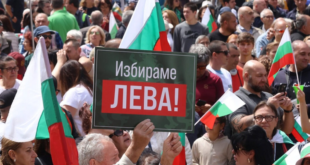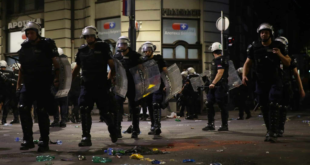Slovenia, the first country to quit Yugoslavia in 1991, becomes EU president on January 1 and will play a lead role in maybe the last act of the old Balkan federation’s demise when Kosovo secedes from Serbia.The 27-member European Union backs independence for the mainly Albanian province of Serbia which lost its autonomy in 1989, resisted passively for a decade, then fought free of Belgrade in 1999.
Now run by the United Nations and protected by NATO, it is expected to declare independence early in 2008 against Serbia’s bitter opposition. Slovenia’s goal will be to ensure the EU, the main power in the region, acts in concert in any crisis.
It is likely to be the bloc’s main political problem of the year, as it tries to prevent any flare-up of violence, bless Kosovo’s long-sought freedom but stop Serbia giving up moves to join the EU and retreating into hostile isolation.
Adding to the headache, independence for the Serbian province is opposed by a handful of the EU’s 27 members.
Slovenia, once the northern border of Serb-dominated Yugoslavia and its richest corner, broke away in 1991 after a skirmish, prospered and joined the EU and NATO in 2004.
The Alpine republic of just two million people volunteered to be the first former communist country to run the rotating six-month presidency of the EU’s 490 million people.
But some political analysts worry the Kosovo issue means the country’s small administration may have bitten off more than it can chew.
EU officials are unsure if Slovenia’s historic and business ties to the turbulent Balkans will prove a blessing or a curse, though Prime Minister Janez Jansa voiced confidence.
“We know the situation very well, also the details which are not easily understandable for countries that are far away,” he told Reuters this month.
The EU presidency “is one of our biggest challenges after independence, both in terms of its contents and organizational tasks. It is a national project,” he told parliament last week.
Analysts say chairing the EU was a great privilege for a country that had been run for centuries from Vienna or Belgrade.
NO SMOOTH RIDE?
Janez Lenarcic, State Secretary for European Affairs, said the presiding country’s duty was mostly to ensure EU consensus on all major issues on the agenda.
Aside Kosovo these will include obtaining swift ratification of an EU reform treaty signed in December and advancing an energy and climate-change program.
“Our main task is to handle well the technical aspect, make sure everything is in place and functioning,” said a senior source close to the government.
He said Slovenia would be aided by the two previous presidents Portugal and Germany — which is seen as something of a mentor for Ljubljana.
Most analysts believe Slovenia, one of the smallest EU members with little political clout, will settle for “a good technical performance” during the presidency, without pushing too many of its own initiatives.
 Eurasia Press & News
Eurasia Press & News



